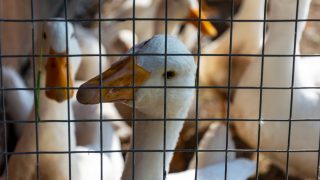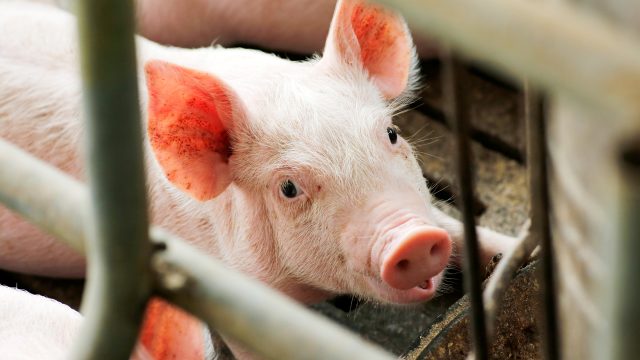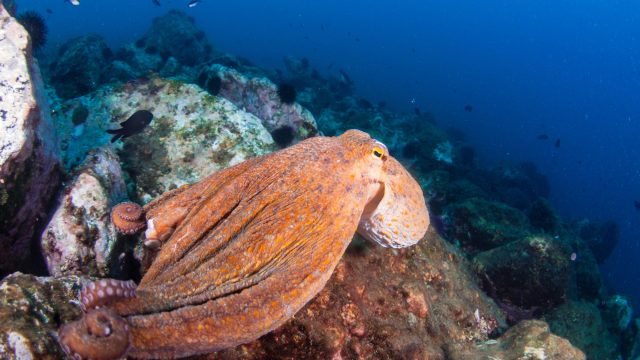
U.S. Supreme Court Upholds Constitutionality of California Foie Gras Ban After Prop 12 Victory
Third denial to review first state-wide ban, starting in 2014
Contact: media@aldf.org
Washington, DC — Today, the U.S. Supreme Court upheld the 9th Circuit Court of Appeals ruling in 2020 deciding that California’s foie gras ban is constitutional as it declined to review the case. California’s law, enacted in 2012, has been subject to a prolonged legal challenge by the foie gras industry since lawmakers enacted a ban on the production and sale of foie gras in 2004.
Foie gras — French for “fatty liver” — is produced by force-feeding ducks or geese until their livers swell to many times their natural size, inducing a painful disease. The birds are then slaughtered so their diseased livers can be eaten.
“On the heels of California’s Prop 12 — the strongest farmed animal law in the country — being upheld, the U.S. Supreme Court has once again prevented the animal agriculture industry’s attempt to block the state’s implementation of animal protection laws that align with the public’s values,” says Animal Legal Defense Fund Managing Attorney Amanda Howell. “The Animal Legal Defense Fund will continue to defend the foie gras ban’s constitutionality and broad enforcement.”
In 2014 the 9th Circuit denied a request by a coalition of foie gras producers to rehear their constitutional challenge against California’s ban, and later that year, the U.S. Supreme Court declined to review the case, allowing the ban to stand. A January 2015 decision barred enforcement of the sales ban, but the 9th Circuit reversed that decision and in 2019, the U.S. Supreme Court again denied the foie gras industry’s petition to overturn the ban. Following the 2019 decision, the industry filed an amended complaint to challenge the constitutionality of the law. In 2020, the U.S. District Court for the Central District of California dismissed the industry’s constitutional challenge in its entirety and forbade the plaintiffs from trying to renew those claims, which the appeals court upheld, and the U.S. Supreme Court denied reviewing in 2023.
After the law was initially enacted, some restaurants in California and the producers who supplied them didn’t want to lose the profits they made from animal cruelty and wantonly violated the law and ignored the humane values prioritized by the voters of the state. For example, in July 2013, the Animal Legal Defense Fund won a legal challenge against La Toque restaurant located in Napa, California (Animal Legal Defense Fund v. LT Napa Partners, LLC) for illegally selling force-fed foie gras products under the guise of “giving it away.” La Toque appealed the Animal Legal Defense Fund’s victory by claiming that breaking the law to sell cruel products was “freedom of speech.” The California Court of Appeal agreed with the Animal Legal Defense Fund that so-called “gifts” of foie gras to paying customers were illegal foie gras sales, and that such conduct is not First Amendment-protected expressive activity under the U.S. Constitution.
A staunch defender of California’s foie gras ban, the Animal Legal Defense Fund filed numerous amicus briefs in the repeated challenges by the industry over nearly a decade span.
Anyone who sees foie gras in California restaurants or stores is encouraged to report the sighting of illegal foie gras to the police, then submit the tip to the Animal Legal Defense Fund via an online tracking form at aldf.org/reportfoiegras.
Report Illegal Foie Gras Sales in California
After a long legal battle, California’s foie gras ban is in full effect, and restaurants are now unambiguously barred from selling the cruelly-produced, high-priced foie gras. But we need your help identifying restaurants that are flouting the law.
Related
-
Rhode Island Governor Signs Cat Declaw Ban into Law
Declawing is an invasive surgical procedure to remove the last bone in a cat's toesJuly 2, 2025 News -
U.S. Supreme Court Declines Review of California’s Landmark Proposition 12 Animal Cruelty Law
The Animal Legal Defense Fund helps protect the strongest farmed animal protection law in the countryJuly 2, 2025 News -
OCTOPUS Act Reintroduced in the U.S. Senate
The federal bill would prevent the industry from gaining traction by banning commercial octopus farming in the U.S.June 5, 2025 Press Release




